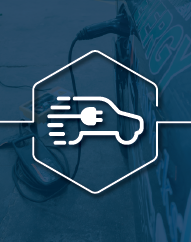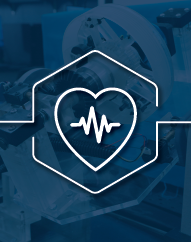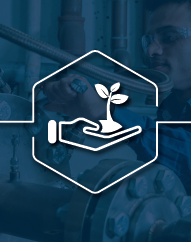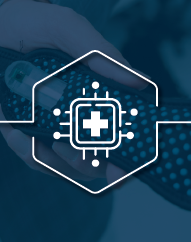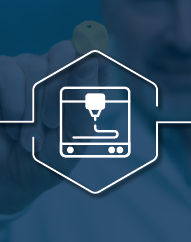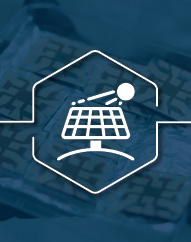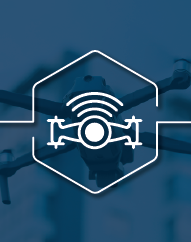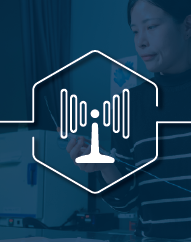Georgia Tech Startup Targets Building Energy Inefficiencies With AI and Drones
Lamarr.AI raised $1.1 million to bring its innovative building diagnostics technology to market.
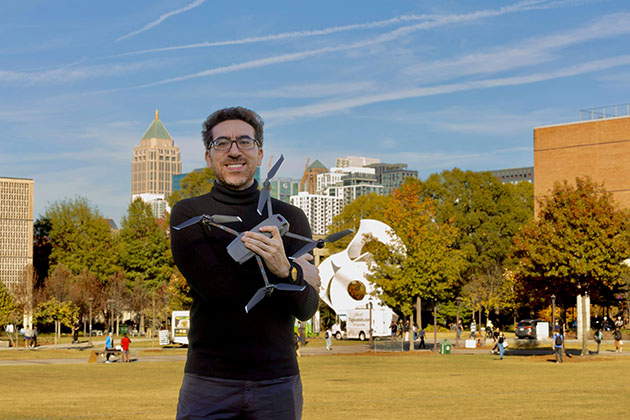
Making buildings environmentally sustainable is a major thrust of Lamarr.AI. The startup leverages advances in drones, thermal imaging, and AI to autonomously detect building defects. Georgia Tech Associate Professor Tarek Rakha co-founded Lamarr.AI to apply this research and scale it across the U.S. and the globe. (Photo credit: Wes McRae, Georgia Tech)
Buildings are big energy consumers, emitting wasteful carbon, contributing to a warming planet, and accounting for more than 40% of the world’s carbon dioxide emissions.
The culprits behind this hefty energy hit are two distinct sources of carbon: the building construction process and a building’s operation and use.
Fortunately, a new startup is paving the way for dramatic reductions in carbon from building operations. Lamarr.AI has perfected the process of using drones, thermal imaging, and artificial intelligence (AI) to diagnose the health of building exteriors and roofs.
The young company — named for Hedy Lamarr, the actor and inventor credited with helping birth the modern telecommunications era — offers an autonomous solution to diagnose a building’s energy footprint. Lamarr.AI is a spin-off from Georgia Tech, Massachusetts of Technology (MIT), and Syracuse University.

Finding Energy Issues Autonomously
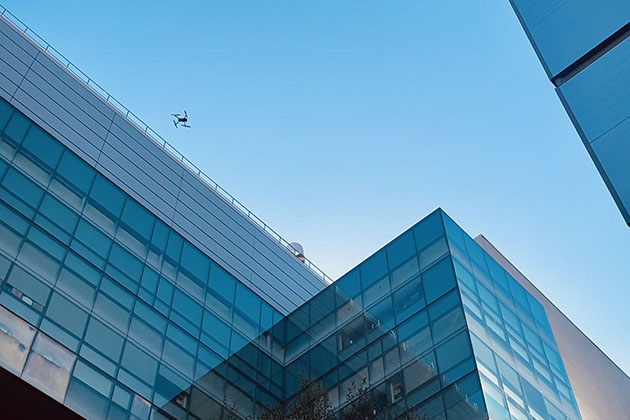
A Lamarr.AI drone flies over a building. (Photo credit: Tarek Rakha)
“Our service is akin to giving your building an MRI scan. It will revolutionize health monitoring for the built world,” said Tarek Rakha, Lamarr.AI CEO and associate professor in Georgia Tech’s School of Architecture. “We actually diagnose the root cause of a building envelope’s defects, map them out on 3D models, and translate them to an energy simulation to quantify lost energy.”
According to the Department of Energy, the U.S. wastes $100 billion in energy due to ineffective building envelopes, which are the shell, or barrier, between a building’s interior and the outdoors.
An expert on computer-vision drones, urban energy sensing, and computation informatics, Rakha currently directs Georgia Tech’s High Performance Building Lab. He collaborated on Lamarr.AI’s development and commercialization with Syracuse University’s Senem Velipasalar and MIT’s Norhan Bayomi and John E. Fernández. Together, the three universities co-own two patents based on Lamarr.AI’s technology.
In October 2024, the company raised $1.1 million in pre-seed funding to bring its building diagnostics technology to market. Hazelview Ventures, the venture capital arm of global real estate firm Hazelview Investments, led the funding round. Other investors include milemark•capital, Newlab, Georgia Tech Foundation Ventures, and MIT’s SBXi Fund.
To date, Lamarr.AI has worked with significant players in the healthcare, higher education, multi-family, residential office building, and industrial warehouse sectors to help building owners identify targeted, cost-effective repairs that save energy.
“I’m very happy with the response we’ve gotten as a very young startup — already making revenue,” said Rakha. He attributes this positive reception to Lamarr.AI’s solution being “cheaper, faster, more accurate, and safer” than the regular means of inspecting a building’s envelope.
Michael Williams, Hazelview Investments managing partner and head of development, said that Lamarr.AI first piqued his interest because of its use of AI and its hyperfocus on building envelopes, which are costly and time-consuming to inspect.
“Having the ability to automate that process and make it a little bit easier on a national scale was extremely compelling to us,” Williams said. “It’s going to have a tremendous impact and will be a game-changer if they continue to evolve the product.”
“Our service is akin to giving your building an MRI scan. It will revolutionize health monitoring for the built world.” — Tarek Rakha
Driving Energy Savings: Early Use Cases
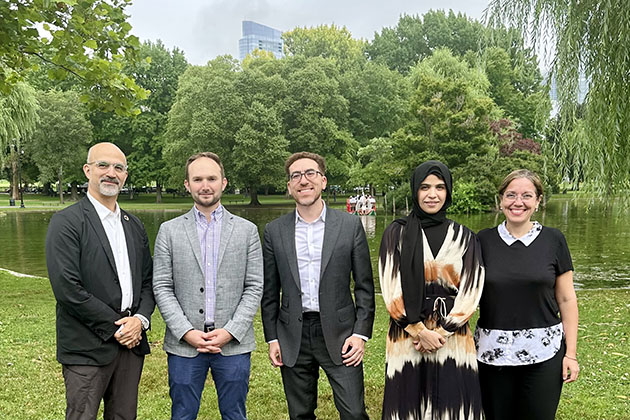
Lamarr.AI’s leadership team includes researchers from Georgia Tech, MIT, and Syracuse University. Pictured on the MIT campus (L to R): John E. Fernández, CSO and co-founder; Ben Rocci, head of strategy and business Development; Tarek Rakha, CEO and co-founder; Norhan Bayomi, COO and co-founder; and Senem Velipasalar, CTO. (Photo courtesy of Lamarr.AI)
Data from early users has shown potential energy savings as high as 30%, depending on the building’s age.
“The return on investment can be met in two to five years and brings benefits to building occupants in terms of more comfortable living conditions,” said Rakha. Buildings that implement recommended fixes enjoy better indoor air quality, as well as lower energy bills.
Lamarr.AI has already helped building owners save nearly $1 million in engineering and construction costs by automatically identifying problems like deteriorated window seals and leaky roofs, in addition to helping effectively plan and scope large building-envelope retrofits.
According to Rakha, his company’s autonomous approach differs dramatically from current energy audits or inspection processes. These are performed manually using a handheld thermal camera to pinpoint problem areas, which isn’t feasible for larger structures.
There are also safety considerations. Traditionally, a comprehensive inspection of a skyscraper, such as the Empire State Building in New York City, would require people “scaling it like Spider-Man,” he explained. Instead, Lamarr.AI flies drones away from the building — a faster process that doesn’t endanger human lives.
As drones fly around a building, they “see” evidence of thermal leakage and other defects. In the wintertime, for example, the drone might pick up a defect that means the building is leaking heat; the AI then identifies the root causes. The company’s AI can also detect cracks and structural risks in building exteriors. When combined with thermal defects, this creates a comprehensive analysis of the building envelope’s health and performance — building managers, architects, and other urban development stakeholders can then act on this information.
Urgency to Act
The building sector will play a key role in the fight against climate change, with adoption of net-zero building certifications on the rise. Lamarr.AI offers a cost-effective, fast path to reducing a building’s carbon footprint and environmental impact.
Rakha emphasized that the race to help buildings achieve carbon net-zero goals is urgent. “There is no other option,” he said, given the rapid pace of the climate crisis.
This research was supported by a Department of Energy BENEFIT 2018 Aerial Intelligence for Retrofit Building Energy Modeling (AirBEM) award.

Media Contact: Shelley Wunder-Smith | shelley.wunder-smith@research.gatech.edu
Writer: Anne Wainscott-Sargent
Photos: Wes McRae, Tarek Rakha, and Lamarr.AI
Video: Wes McRae, Sid Bhaskaran, and Gael Juarez-Romero
Copy Editor: Kelly Adams
Design: Josie Giles
Series Design: Stephanie Stephens
About Georgia Tech Commercialization
Georgia Tech Commercialization provides a foundation for faculty seeking to translate the Institute's leading-edge research into real-world applications. Commercialization encompasses four pivotal units: CREATE-X, VentureLab, Quadrant-i, and Technology Licensing. These units empower students and faculty to launch startups, provide comprehensive commercialization support, manage intellectual property, and facilitate the transformation of research into viable businesses. The Office of Commercialization’s mission is to provide world-class commercialization services, catalyzing research and innovation to improve the human condition, and enhancing Georgia Tech's position as a leader in technology and entrepreneurial impact.
Paradigm Shifters Series
New Smart Charger May Pave the Way for More EVs
The revolutionary system allows for cheaper, carbon-free charging and aims to reduce the burden on the electric grid as more EVs enter the roadway.
World’s Smallest Robotic Guidewire Improves Surgical Precision
The robot is a groundbreaking surgical device that helps doctors navigate blood vessels with precision during procedures like angioplasty.
Researchers Create a Low-Emission, Fuel-Flexible Combustion System
This new combustor uses carbon-free fuels that will power planes and heat buildings.
New Wearable Device Monitors Joint Pain
Arthroba enables everyday people and their doctors to follow their joint health in real time.
New Implant May Help Patients Regenerate Their Own Heart Valves
Georgia Tech researchers have developed a groundbreaking 3D-printed, bioresorbable heart valve that promotes tissue regeneration.
Researchers Build Stable Solar Panel Without Silicon
Solar power as an electricity source is growing in the U.S., but scientists are still trying to make the solar panel production process more efficient.
Startup Targets Building Energy Inefficiencies With AI and Drones
Lamarr.AI uses drones, AI, and thermal imaging to identify energy inefficiencies in buildings, offering a faster, safer, and more accurate solution.
This Pacifier Could Monitor Babies’ Vitals in the NICU
The baby-friendly device measures electrolyte levels in real time, eliminating the need for repeated, painful blood draws.
This Small Sensor Could Make Huge Impacts on Brain Injury Treatment
Researchers develop a tinier sensor for less invasive intracranial monitoring.

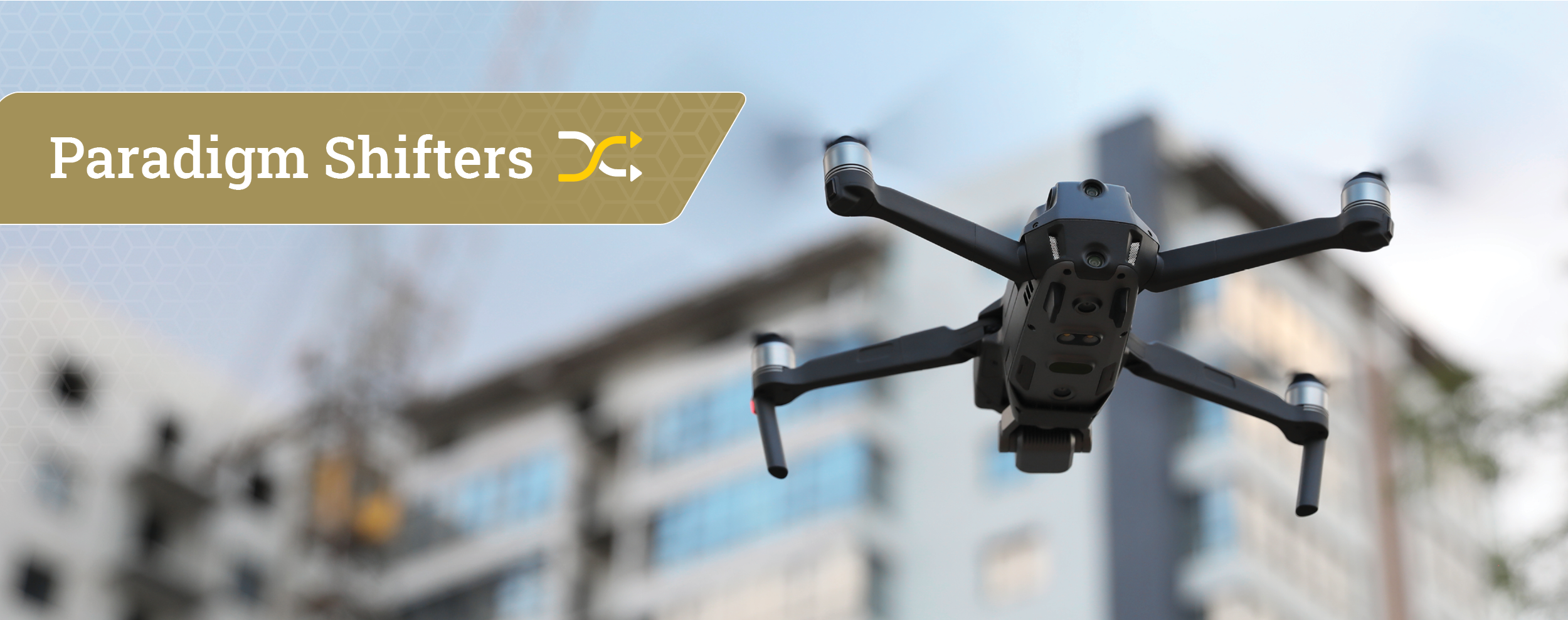
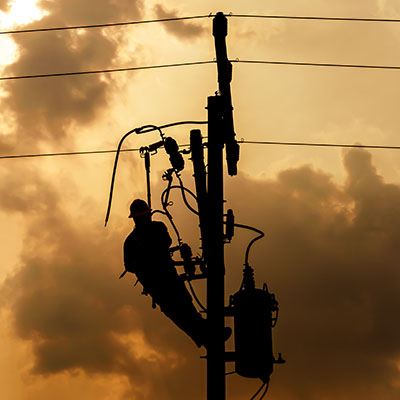 What's A City to Do When The Power Goes Out?
What's A City to Do When The Power Goes Out? 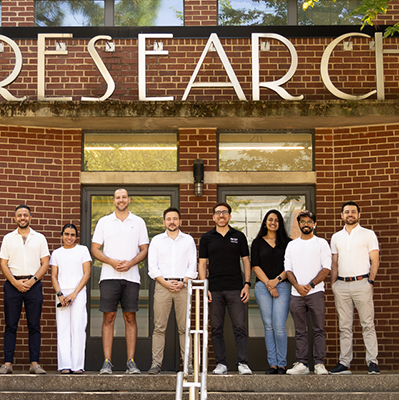 High Performance Building Lab
High Performance Building Lab  Aerial Diagnostics
Aerial Diagnostics 